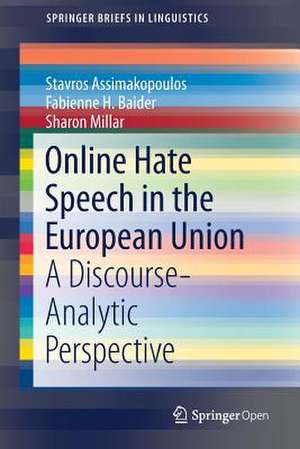Online Hate Speech in the European Union: A Discourse-Analytic Perspective: SpringerBriefs in Linguistics
Autor Stavros Assimakopoulos, Fabienne H. Baider, Sharon Millar Contribuţii de Natalie Alkiviadou, César Arroyo López, Pablo Bernardino Tempesta, Tatsiana Chulitskaya, Anna Constantinou, Klaus Geyer, Łukasz Grabowski, Uladzislau Ivanou, Monika Kopytowska, Roberto Moreno López, Rasmus Nielsen, Valentina Oliviero, Anastasia Petrou, Ernesto Russo, Rebecca Vella Muskat, Anna Vibeke Lindø, Georgia Whitaker, Julita Woźniaken Limba Engleză Paperback – 10 ian 2018
This open access book reports on research carried out as part of the European Union co-funded C.O.N.T.A.C.T. project which targeted hate speech and hate crime across a number of EU member states. It showcases the bearing that discourse analytic research can have on our understanding of this phenomenon that is a growing global cause for concern.
Although ‘hate speech’ is often incorporated in legal and policy documents, there is no universally accepted definition, which in itself warrants research into how hatred is both expressed and perceived. The research project synthesises discourse analytic and corpus linguistics techniques, and presents its key findings here. The focus is especially on online comments posted in reaction to news items that could trigger discrimination, as well as on the folk perception of online hate speech as revealed through semi-structured interviews with young individuals across the various partner countries.
Din seria SpringerBriefs in Linguistics
-
 Preț: 377.73 lei
Preț: 377.73 lei -
 Preț: 378.92 lei
Preț: 378.92 lei - 15%
 Preț: 461.54 lei
Preț: 461.54 lei -
 Preț: 377.35 lei
Preț: 377.35 lei -
 Preț: 476.95 lei
Preț: 476.95 lei -
 Preț: 378.71 lei
Preț: 378.71 lei -
 Preț: 476.21 lei
Preț: 476.21 lei -
 Preț: 378.92 lei
Preț: 378.92 lei -
 Preț: 378.92 lei
Preț: 378.92 lei -
 Preț: 378.54 lei
Preț: 378.54 lei -
 Preț: 448.58 lei
Preț: 448.58 lei -
 Preț: 412.30 lei
Preț: 412.30 lei -
 Preț: 379.86 lei
Preț: 379.86 lei -
 Preț: 376.80 lei
Preț: 376.80 lei
Preț: 410.01 lei
Nou
Puncte Express: 615
Preț estimativ în valută:
78.45€ • 82.35$ • 65.12£
78.45€ • 82.35$ • 65.12£
Carte tipărită la comandă
Livrare economică 10-24 aprilie
Preluare comenzi: 021 569.72.76
Specificații
ISBN-13: 9783319726038
ISBN-10: 331972603X
Pagini: 127
Ilustrații: VIII, 90 p.
Dimensiuni: 155 x 235 mm
Greutate: 0.15 kg
Ediția:1st ed. 2017
Editura: Springer International Publishing
Colecția Springer
Seria SpringerBriefs in Linguistics
Locul publicării:Cham, Switzerland
ISBN-10: 331972603X
Pagini: 127
Ilustrații: VIII, 90 p.
Dimensiuni: 155 x 235 mm
Greutate: 0.15 kg
Ediția:1st ed. 2017
Editura: Springer International Publishing
Colecția Springer
Seria SpringerBriefs in Linguistics
Locul publicării:Cham, Switzerland
Cuprins
Chapter 1: Introduction And Background.- Chapter 2: Analysing Online Comments To News Reports.- Chapter 3: Approximating Young People’s Perception Of Hate Speech.- Chapter 4: Concluding Remarks.
Textul de pe ultima copertă
This book is open access under a CC BY 4.0 license and reports on research carried out as part of the European Union co-funded C.O.N.T.A.C.T. project which targeted hate speech and hate crime across a number of EU member states. It showcases the bearing that discourse analytic research can have on our understanding of this phenomenon that is a growing global cause for concern.
Although ‘hate speech’ is often incorporated in legal and policy documents, there is no universally accepted definition, which in itself warrants research into how hatred is both expressed and perceived. The research project synthesises discourse analytic and corpus linguistics techniques, and presents its key findings here. The focus is especially on online comments posted in reaction to news items that could trigger discrimination, as well as on the folk perception of online hate speech as revealed through semi-structured interviews with young individuals across the various partner countries.
Although ‘hate speech’ is often incorporated in legal and policy documents, there is no universally accepted definition, which in itself warrants research into how hatred is both expressed and perceived. The research project synthesises discourse analytic and corpus linguistics techniques, and presents its key findings here. The focus is especially on online comments posted in reaction to news items that could trigger discrimination, as well as on the folk perception of online hate speech as revealed through semi-structured interviews with young individuals across the various partner countries.
Caracteristici
Offers unique insights on online hate speech by combining discourse analytic and corpus linguistics methods Presents the findings from the EU co-funded C.O.N.T.A.C.T. research project, targeting hate speech and hate crime across a number of EU member states Focuses on online reactions to news items and reveals the folk perception of online hate speech Includes supplementary material: sn.pub/extras
